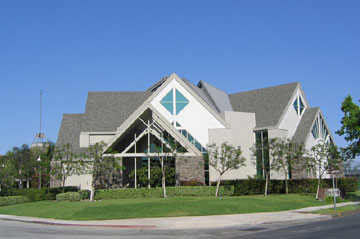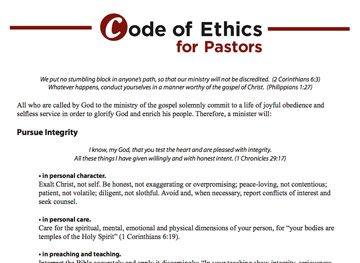Code of Ethics for Pastors: A Commentary
This is my third blog post focusing on the new Code of Ethics for Pastors. This Code has five main sections:
Pursue Integrity
Be Trustworthy
Seek Purity
Embrace Accountability
Facilitate Fairness.
Under each category, there are several statements of clarification or application. Today, I want to comment on the first section:
Pursue Integrity
I know, my God, that you test the heart and are pleased with integrity.
All these things I have given willingly and with honest intent. (1 Chronicles 29:17)
• in personal character.
Exalt Christ, not self. Be honest, not exaggerating or overpromising; peace-loving, not contentious; patient, not volatile; diligent, not slothful. Avoid and, when necessary, report conflicts of interest and seek counsel.
• in personal care.
Care for the spiritual, mental, emotional and physical dimensions of your person, for “your bodies are temples of the Holy Spirit” (1 Corinthians 6:19).
• in preaching and teaching.
Interpret the Bible accurately and apply it discerningly: “In your teaching show integrity, seriousness and soundness of speech that cannot be condemned” (Titus 2:7-8). Speak the truth in love. Give due credit when using the words or ideas of others.
Our word “integrity” derives from the Latin word “integer,” which means “intact, whole, complete.” The person who has integrity is a whole person, someone whose life hangs together, whose words and deeds are congruent. A person with integrity speaks what is true and lives what is true. Surely, all pastors should pursue integrity. In particular, pastors should seek integrity “in personal character, in personal care, and in preaching and teaching.”

Several of the details in this section of the Code for Pastors reflect the “honesty” sense of “integrity.” Yet, many of the specific injunctions of this section seem to be oddly related to integrity. “Exalt Christ, not self” is about humility and worship. Be “patient, not volatile” is sound biblical advice, but I’m not sure how it expresses integrity.
I fully agree that pastors should “Care for the spiritual, mental, emotional and physical dimensions of your person.” But is this really about integrity? Or is it rather about the fact that we do not belong to ourselves, but to the Lord, as we learn in 1 Corinthians 6.
Several of the specifics of this section have been shaped in light of pitfalls into which pastors frequently fall. Many pastors tend to exaggerate (in the stories they use in preaching, in reporting on the attendance at their churches, etc.). Many do not care for their bodies as if they were temples of the Holy Spirit. Many do not “give due credit when using the words or ideas of others.” The Internet has made this last pitfall particularly common, since preachers often get facts, stories, and quotes from the Internet without seeking the source in order to give appropriate credit. Moreover, they sometimes pass on as truth various Internet legends, without checking to make sure they are telling the truth.
Apart from the fact that I find the grouping of items here not evenly related to integrity, I am perplexed about what is missing. Except by implication, this section does not mention what seems to me most central to integrity and essential for pastoral ethics: Live what you speak. Live as a demonstration of the Gospel. Let your life be a whole expression of who you are in Christ. So many of the painful pastoral scandals in our day are related, not just to the fact that pastors sin, but especially to the fact they often do exactly what they have preached against. They might very well have been speaking the truth and interpreting the Bible accurately. But what was missing was integrity, that is, wholeness and completeness.
Finally, this section on integrity is relevant, not only to pastors, but to all Christians. The only bit that could be uniquely suited for pastors is the “in preaching and teaching” part. But, given that fact that all Christians are to “teach and admonish one another with all wisdom” (Col 3:16), even the last subsection is mostly relevant to every believer, and not just to pastors. This isn’t a problem. But it is worth mentioning that many (most?) of the core elements of pastoral ethics are, in fact, the core elements of Christian ethics.











